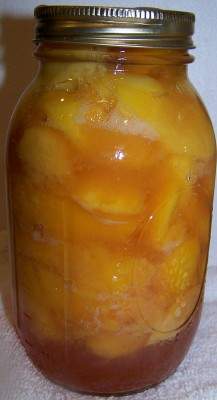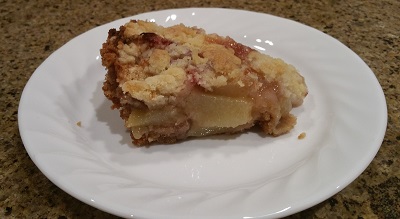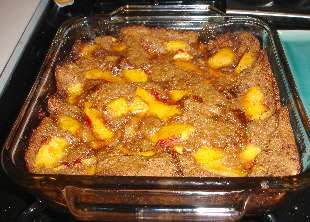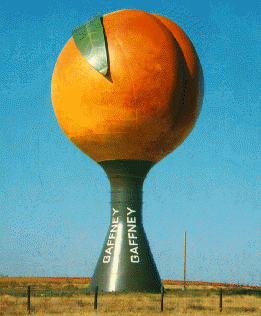
Peach U-Pick Orchards in Dallas area of Texas in 2025, by county
Below are the U-Pick orchards and farms for peaches that we know of in this area.
Not all areas of a state have peaches orchards that are open to the public. If you know of any others, please tell us using the add a farm form!
Remember to always check with the farm's own website or Facebook page before you go - or call or email them if they don't have a website or Facebook page. Conditions at the farms and crops can change literally overnight, so if you want to avoid a wasted trip out there - check with the farm directly before you go! If I cannot reach them, I DON'T GO!
PLEASE report closed farms, broken links and incorrect info using the "Report Corrections" form below.
New! As inflation remains high, see this page for
reliable (tested) brands of generic canning lids at lower
costs, and cost-saving measures for
getting fruit and vegetables and home canning.
If you are having a hard time
finding canning lids, I've used these, and they're a great price & ship in 2 days.
New! Road tripping and camping is a great way to have a fun, safe and inexpensive family trip. The national and state parks and monuments are open, and campgrounds usually cost between $10 and $40 per night. September to November is the best camping weather. See our new website Road Tripping and Camping.com for tips, tricks, guides, checklists and info about parks, monuments and other places to visit.
New! We just went live with our latest website, FunFactoryTours.com - As they name implies, you can find a fun factory tour, including chocolate, automobiles, historical forts and sites, famous buildings, Active Federal facilities even fun geology: like fossils and volcanic areas
Fannin County
- Jenkins Farms - blackberries, peaches, plums, restrooms
269 Cr 1600, Ravenna, TX 75476. Phone: 903-583-2220. Email: patclaude@verizon.net. Open: around May 15 for picking; When we have fruit we are open 7days 8 to 5; Please call to verify on availability the message is updated nightly. Directions: North of Bonham on Hwy78 about 12 miles and left on FM274 go about 1 12 miles there will be a sign on the right. approximately 75 miles from the Dallas area. Click here for a map and directions. Payment: Cash, Check.
Jenkins Farms Facebook page. approximately 75 miles from the Dallas area. . If you want us to pick please call ahead. Typical Crop availability (but still CALL before you come): Blackberries, Plums in June, Peaches in June-July. . (UPDATED: April 27, 2025, JBS)
[ Click here to update the listing ]
Hood County
- Fall Creek Farms - 2025 assumed permanently closed, Uses natural growing practices, peaches, strawberries, Honey from hives on the farm, restrooms, picnic area, farm animals, school tours, events at your location (call for info)
6920 Fall Creek Hwy., Granbury, TX 76049. Phone: 817-910-9232. Email: TheCrisps@UpickTX.com. Open: permanently closed. Directions: 2 miles south from Acton on Fall Creek Hwy. \\(Hwy. 167\\) . Click here for a map and directions. Payment: Cash, only. upicktx.com is now taken over by Sand Creek Homeowners? WTH? Call for picking times. (Hwy. 167) Crops are usually available in March, April, May, July, August. Home of the world's largest armadillo named "Killer". More than a million people saw Killer when it was the centerpiece in Six Flags' Best of Texas exhibit in 2002. We do practice organic methods, but are not certified. . Spring Strawberries - we have a giant two acre patch of more than 17,000 Chandler and Sequoia plants.In the summer we have Peaches; 10 acres and 500 trees of delicious, juicy peaches. It has been said that nobody can resist sampling the peaches while you're picking. Get away from the hustle and bustle of the city and come to the country. An afternoon trip to is fun and memorable experience for the entire family. (UPDATED: April 27, 2025, JBS)
[ Click here to update the listing ]
Kaufman County
- Ham's Orchards - PYO blackberries and ALREADY PICKED peaches
11939 CR 309, Terrell, TX . Phone: 972-524-2028. Email: admin@hamorchard.com. Open: Daily from 9 am to 5 pm, starting in mid-May. Directions: Call for directions. Blackberries usually from Mid May to Mid June. We do have prepicked peaches and most all other vegetables and fruit until we close for the season on August 15th each year. Prepicked Blackberries are typically available from May to July \\(but in2012, as of 63012, they are finished for the season\\). Our peaches are hand picked with the utmost care to ensure the quality you expect from Ham Orchards. For this reason, we do not allow the public to pick their own pea - truncated. Click here for a map and directions.
Ham's Orchards Facebook page. Blackberries usually from Mid May to Mid June. We do have prepicked peaches and most all other vegetables and fruit until we close for the season on August 15th each year. Prepicked Blackberries are typically available from May to July (but in2012, as of 6/30/12, they are finished for the season). Our peaches are hand picked with the utmost care to ensure the quality you expect from Ham Orchards. For this reason, we do not allow the public to pick their own peaches. Pick-Your-Own Blackberry Patch is usually open from the end of May through June, the pick-your-own Blackberry Patch is located just behind Ham's Farm Market Store. . Bring tennis shoes; maybe a pair of rain boots; and an empty tummy, then grab a picking bucket from the store to get started.Our hand-picked blackberries are also available for sale in the store. (UPDATED: April 27, 2025, JBS) (UPDATED: June 30, 2012, by a visitor)
[ Click here to update the listing ]
Leon County
- Huebner Berry Patch and Fruit Farm - Blackberries, peaches, nectarines, Muscadines, grapes,
4302 PR 4010, Normangee, TX 77871. Phone: 903-344-1132. Email: huebners@hcecwildblue.com. Open: from 8am to 5pm or until picked out for the day. Directions: From Centerville: Take Hwy. 75 South to Leona. Turn right \\(West\\) on FM 977. Go 3 miles to FM 2485 North. Turn right and go 3 miles to PR 4010. Turn left, follow road 14 mile to farm. Season typically are: Peaches, typically ripe from May through July. Blackberry picking season normally goes from late May to late June or early July depending on weather. We have five varieties of blackberries. One variety is thorned \\(Kiowa\\) and four varieties of thornless. Our thorn - truncated. Click here for a map and directions. Payment: cash, checks (in county), credit and debit cards. Start a new family tradition of picking your own fresh blackberries, tree ripened peaches and plums Also offering pre-picked berries, peaches and plums, as well as Carole's homemade jams & jellies. 75 South to Leona. Turn right (West) on FM 977. Go 3 miles to FM 2485 North. Turn right and go 3 miles to PR 4010. Turn left, follow road 1/4 mile to farm. Season typically are: Peaches, typically ripe from May through July. Blackberry picking season normally goes from late May to late June or early July depending on weather. We have five varieties of blackberries. One variety is thorned (Kiowa) and four varieties of thornless. Our thornless varieties include Ouachita, Natchez, Osage and Caddo. Plums - Late May to late June; varieties are Methley, Morris, Ozark Premiere. (UPDATED: April 27, 2025, JBS)
[ Click here to update the listing ]
Tarrant County
- Henrietta Creek Orchard - Pick your own apples, peaches, black-eyed peas, squash, and okra, Plums, tomatoes, Seasonal Vegetables, Pumpkin patch
14255 Old Denton Road, Roanoke, TX 76262. Phone: 817-439-3202. Email: ss.apple@juno.com. Open: See this page for picking updates. Directions: Henrietta Creek Orchard is located in North Tarrant County. We are East of the Alliance Airport and South of the Texas Motor Speedway. From I-35W exit #66. Turn East on Keller Haslet Road after .7 mile. Take a left \\(North\\) on Old Denton Road. After traveling North about 1.2 mile the road curves to the right. We are about .25 mile on the left after the curve. Please use the second entrance.A family owned orchard with Pick Your Own Apples in 10 varieties, peaches 6 varieties\ - truncated. Click here for a map and directions. We are East of the Alliance Airport and South of the Texas Motor Speedway. From I-35W exit #66. Turn East on Keller Haslet Road after .7 mile. Take a left (North) on Old Denton Road. After traveling North about 1.2 mile the road curves to the right. We are about .25 mile on the left after the curve. Please use the second entrance.A family owned orchard with Pick Your Own Apples in 10 varieties, peaches 6 varieties) Our orchard has over 500 hybrid dwarf apple trees & around 200 peach trees. We also have a pizza garden that includes tomatoes, peppers, garlic and other herbs. We also offer preserves, jellies, salsa, honey and fruit butters for sale in the Apple House (some of these items are sugar free.) (UPDATED: April 27, 2025, JBS)
Comments from a visitor on April 29, 2011: "Just an FYI - this farm is alive and well and growing healthy apple and peach trees. It is a great place for taking children to learn about sustainable gardening and farming. "
[ Click here to update the listing ]
Peaches
Peach Picking Tips, Recipes and Information
 In
the U.S., Peaches typically peak during late June through July in the South, and
July and August in the North. In order to produce good local peaches, producers
depend on ideal spring and early summer weather conditions, and no late frosts.
If you want to know
which are the best varieties of
peaches for home canning, see this page!
In
the U.S., Peaches typically peak during late June through July in the South, and
July and August in the North. In order to produce good local peaches, producers
depend on ideal spring and early summer weather conditions, and no late frosts.
If you want to know
which are the best varieties of
peaches for home canning, see this page!
Before you leave to go to the farm:
- Always call before you go to the farm - Peaches are affected by weather (both rain and cooler temperature) more than most crops. And when they are in season, a large turnout can pick a field clean before noon, so CALL first!
- Leave early. On weekends, then fields may be picked clean by NOON!
-
Most growers furnish picking containers designed for peaches, but they may
charge you for them; be sure to call before you go to see if you need to
bring
containers.
If you use your own containers, remember that heaping Peaches more than 14 inches deep will bruise the fruit on the bottom. Plastic dishpans, metal oven pans with 3 inch tall sides and large pots make good containers.
- Bring something to drink and a few snacks; you'd be surprised how you can work up a thirst and appetite! And don't forget hats and sunscreen for the sun. Bugs usually aren't a problem, but some deet might be good to bring along if it has been rainy.
- You might want to ask whether the peaches are! There are two major types of peaches: "Freestone" and. "Clingstone". Freestone peaches and nectarines have flesh that slips easily away from the pit. Clingstones are a REAL pain, because the fruit tenaciously clings to the stone or pit! Most peach varieties grown today are freestone and are usually available (depending upon your location) from June through September. Some nectarines are freestone and some are clingstone. Freestone nectarines are available in June and July. Most plum varieties are clingstone.
When you get home
- Spread the fruit out on towels or newspapers and separate any mushy or damaged fruit to use immediately.
- Put a couple of days supply into the fridge, wash and cut the others and freeze them up!
- Even under ideal conditions peaches will only keep for a week in a refrigerator, so for best flavor and texture, use them as soon as possible after purchase
- Now, get ready to make Peach jam or canned peaches - It is VERY easy -
especially with our free
- peach jam instructions - they're illustrated and easy and our page on
- how to make home canned peaches from fresh!
- Or see here to freeze peaches instead!
- make your own home canned peach pie filling to use in the winter - Here's a great and easy peach pie
recipe
or peach-blueberry pie or how about
- peach salsa?
- Peach chutney
- Spiced peaches
- peach butter
- Peach honey
- pickled peaches
- peach syrup
- peach juice
- Here are some great and easy peach desert recipes, like easy peach cobbler.
- If you want more information about the Giant Peach water tower in Gaffney, SC, click here.
Temporary Storage Tips
- Ripe peaches have a creamy or golden undertone and "peachy-sweet" fragrance.
- Peaches should be refrigerated and used within a few days.
- Putting peaches and nectarines in a loosely closed paper bag at room temperature for a day or two can help soften firm fruit - but they won't become sweeter or ripen further - that stopped when they were removed from th etree.
- For best flavor, allow the fruit to ripen fully on the tree.
- Store at 33 F to 40 F and high humidity (a vegetable drawer in the fridge).
How to tell if the peaches are ripe!

- Attached to the tree: Peaches are best picked when the fruit separates easily from the twigs. If it is hard to pull off the tree, it isn't ripe! Peaches will not ripen further once removed from the tree (they only "soften")
- Color: Green is definitely unripe, but you can't use red color as an indicator of how ripe a peach is. Different peach varieties have differing amounts of red blush in their natural coloring. Pick them when the ground color changes from green to yellow, orange, red (or a combination). The skin of yellow-fleshed varieties ripens to an orange tint, while the skin of white-fleshed varieties changes from greenish- to yellow-white.
- Softness: unless you like your peaches very firm, pick your peaches with just a little "give" when gently pressed. Peaches at this stage are great for eating, freezing, and baking. Peaches won't ripen very much after picking!
- Odor: It should smell sweet and ripe!
Tips on How to Pick Peaches
A peach is softer than most fruit, so it is important to pick a peach gently, with little pressure. Using the sides of your fingers rather your fingertips helps to avoid bruising. Grab the peach firmly and pull it straight off the branch. DON'T drop the peach into the basket, but set it in gently!
Marks on the Peachs: Bugs (particularly squash bugs and stink bugs) bite fruit during development and this results in some imperfections in the peach. This is especially the case with organically raised fruit. These look like dents in the peaches if the peaches were bitten by a bug when they were young. This causes a spot that does not grow properly and makes a wrinkle in the peach. There's nothing wrong with these peaches. They may look funny, but they will taste just as good as blemish-free peaches, and it's better not to have the pesticides!
How much do you need?
Raw measures:
- About 2 medium peaches = 1 cup sliced peaches.
- About 4 medium peaches = 1 cup pureed peach.
- About 3 medium peaches = 1 pound of peaches
Process yields (Raw amounts to processed amounts)
- 2 to 21/2 pounds of fresh peaches yields 1 quart canned
- 1 lb of fresh peaches typically yields 3 cups of peeled, sliced peaches or 2 cups or puree.
- It takes about 5 good sizes peaches or nectarines (or about 10 plums) to fill one quart jar of canned peaches.
- An average of 171/2 pounds of fresh peaches are needed per canner load of 7 quarts;
- An average of 11 pounds is needed per canner load of 9 pints.
- 1 bushel = 48 to 50 pounds, yields approximately 18 to 25 quart jars.
And a visitor contributes this: 6-7 peaches makes about 4 cups puree, so 2-3 peaches make about 2 cups puree. 1 peach equals about 1 cup puree.
Peaches - Average retail price per pound and per cup equivalent, Most recent data (2020)
| Form | Average retail price *3 | Preparation yield factor | Size of a cup equivalent | Unit | Average price per cup equivalent | |
| Fresh *1 | $1.72 | per pound | 0.96 | 0.342 | pounds | $0.61 |
| Canned | ||||||
| Packed in juice *2 | $2.02 | per pound | 1 | 0.540 | pounds | $1.09 |
| Packed in syrup or water *3 | $1.81 | per pound | 0.65 | 0.441 | pounds | $1.23 |
| Frozen | $3.39 | per pound | 1 | 0.331 | pounds | $1.12 |
| Note 1 - The USDA National Nutrient Database for Standard Reference (SR) reports that the inedible pit of a peach accounts for 4 percent of the retail weight, implying a preparation yield of 96 percent, when eaten raw. | ||||||
| Note 2 - Consumers are assumed to eat the solid fruit and drink the juice. All contents of the can are edible and count towards an individual's recommended fruit consumption. | ||||||
| Note 3 - The syrup (or water) is discarded prior to consumption. Based on the Food Patterns Equivalents Database (FPED), ERS assumes that 65 percent of the can's gross weight is solid and 35 percent is liquid. The FPED cup equivalent weight for canned fruit is the weight of the solids and not of the liquid medium in which it is packed. The preparation yield factor for canned peaches in the above table does not account for any further preparation that occurs prior to consumption. | ||||||
| Source: USDA, Economic Research Service calculations from 2020 Circana (formerly Information Resources, Inc. [IRI]) OmniMarket Core Outlets (formerly InfoScan) data; the USDA National Nutrient Database for Standard Reference (SR), Legacy Release; and the Food Patterns Equivalents Database (FPED) 2017–18 as well as the FPED's accompanying Methodology and User Guide. | ||||||
---
Peach pit tips
It's best to remove peach pits before you cook the peaches. Cherry, peach, and apricot pits also contain amygdalin; the latter two, in potentially harmful amounts. Fortunately, peach and apricot pits are sufficiently large and hard that few people intentionally swallow or chew them. (The unapproved anti-cancer drug See this page for more information&URL=http%3A%2F%2Fwww.cancer.gov/cancerinfo/pdq/cam/laetrile">Laetrile is a semisynthetic derivative of amygdalin; a cheaper version of laetrile produced in Mexico came from crushed apricot pits.) See this page for more information.
Other Local Farm Products (Honey, Horses, Milk, Meat, Eggs, Etc.)
(NOT pick-your-own, unless they are also listed above)
- Farm markets and roadside stands
- Local Honey Finder
- Local Meat, Milk and Eggs
- Venues: Farms, Wineries, Orchards for your event, wedding or party
- Easter egg hunts
- Children"s consignment sales
- Fruit and vegetable festivals
- Winery tours and wine tastings
- Horse rides, stables, lessons, trails
- Maple Syrup farms and sugarworks
- Bed & Breakfasts on Farms, Wineries, Ranches and Orchards
- Pumpkin patches
- Corn mazes
- Zombie Paintball venues
- Christmas Tree Farms & lots
- Environmental resources
- Consumer fraud information
- Wholesale food sources
- Resources for Farmers
Looking for canning equipment and supplies?
Water bath canner with a jar rack
Pressure canners for gas, electric and induction stoves: Presto 23Qt or T-fal 22Qt
Canning scoop (this one is PERFECT)
Ball Blue book (most recent version)
Jars: 8oz canning jars for jams
Find Other types of farms:
Farm markets and roadside stands
Road trips and camping resources
Local Honey, apiaries, beekeepers
Consumer fraud and scams information
Home canning supplies at the best prices on the internet!
Maple Syrup Farms, sugarworks, maple syrup festivals
Environmental information and resources
Farms For Your Event for birthday parties, weddings, receptions, business meetings, retreats, etc.
Festivals - local fruit and vegetable festivals
Get the
most recent version of
the Ball Blue Book
With this Presto 23 quart pressure canner and pressure cooker, you can "can" everything, fruits, vegetables, jams, jellies, salsa, applesauce, pickles, even meats, soups, stews. Model 01781

You can make jams, jellies, can fruit, applesauce, salsa and pickles with water bath canners, like this Granite Ware 12-Piece Canner Kit, Jar Rack, Blancher, Colander and 5 piece Canning Tool Set


